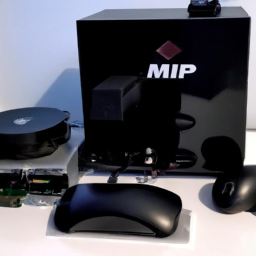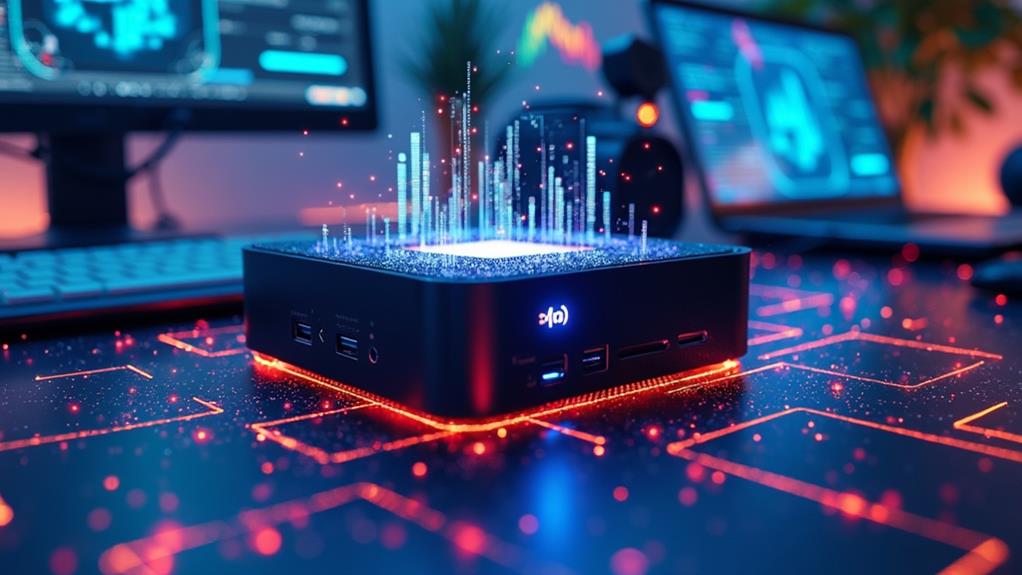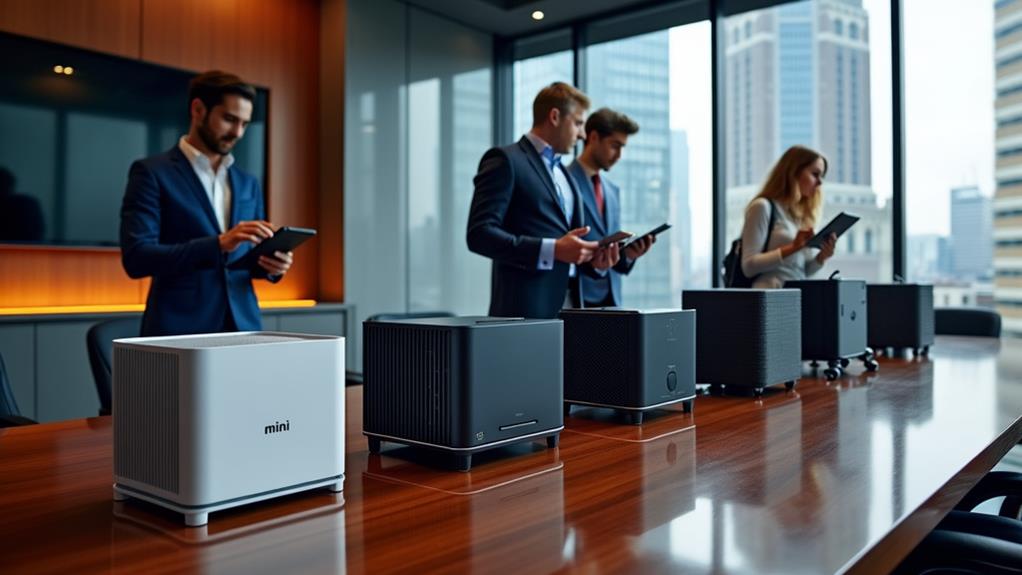



If you’re a gaming enthusiast looking for a compact and versatile gaming solution, you might be wondering: are mini PCs good for gaming? With their sleek and portable design, mini PCs have become increasingly popular among gamers. In this article, we’ll explore the advantages and disadvantages of using mini PCs for gaming, and shed light on whether they can truly deliver the performance you crave. So, buckle up and let’s dive into the world of mini PCs as a gaming option.
Understanding Mini PCs
Definition of Mini PCs
Mini PCs, also known as small form factor computers, are compact and portable computing devices that are designed to deliver adequate performance while occupying minimal space. These machines are similar to traditional desktop computers but are significantly smaller in size, making them ideal for various purposes, including gaming.
History and Evolution of Mini PCs
The concept of miniaturizing computers can be traced back to the early 1970s when personal computers were first introduced. However, it wasn’t until the late 1990s that mini PCs started gaining popularity among consumers. Over the years, advancements in technology have allowed manufacturers to create smaller and more powerful mini PCs, catering to the demands of modern users.
Main Components of a Mini PC
Like their larger counterparts, mini PCs consist of several key components that work together to provide seamless functionality. These components include a processor (CPU), random access memory (RAM), storage devices such as hard drives or solid-state drives (SSDs), graphics cards (GPU), and input/output (I/O) ports for connecting peripherals.
Mini PCs Vs Traditional PCs for Gaming
Differences in Structure and Design
One of the primary distinctions between mini PCs and traditional PCs lies in their structure and design. While traditional PCs usually come in a tower or desktop form factor with ample space for additional components, mini PCs are significantly smaller and more compact. The compact design of mini PCs allows for better portability and space efficiency.
Comparison of Performance Capability
When it comes to gaming, performance capability is a crucial factor to consider. Traditional PCs, with their larger size and expandability, generally have higher performance capabilities than mini PCs. However, with advancements in technology, manufacturers have been able to develop mini PCs that can deliver impressive gaming performance comparable to that of traditional PCs, making them a viable choice for gamers with space constraints.
Portability and Space Efficiency
One area where mini PCs excel in comparison to traditional PCs is portability and space efficiency. Mini PCs, due to their compact size, are highly portable and easy to transport. This makes them an excellent option for gamers who frequently travel or have limited space for a gaming setup. Additionally, their small footprint allows for better space utilization, making them suitable for smaller gaming spaces.
Pros of Using Mini PCs for Gaming
Compactness and Portability
The compact size and portable nature of mini PCs make them an attractive choice for gamers. Whether you want to game on the go or have limited space in your gaming area, mini PCs offer the flexibility and convenience of being easily transportable. You can set up your gaming station in various locations without sacrificing performance or dealing with the bulkiness of traditional PCs.
Low Power Consumption
Mini PCs are known for their energy-efficient design, resulting in lower power consumption compared to traditional PCs. This not only helps reduce electricity bills but also contributes to sustainability. By opting for a mini PC for gaming, you can enjoy extended gaming sessions without worrying about excessive power usage.
Affordability
In terms of cost, mini PCs often offer a more affordable alternative to traditional PCs. While high-end gaming mini PCs may still come with a hefty price tag, there are budget-friendly options available that provide decent gaming performance at a fraction of the cost. For gamers on a tight budget, mini PCs offer a cost-effective solution without compromising on the gaming experience.
Silent Operation
Mini PCs are engineered to operate quietly, thanks to their compact designs and efficient cooling systems. Unlike traditional PCs with multiple fans and larger cases, mini PCs produce less noise during operation. This means you can fully immerse yourself in your gaming experience without distractions caused by loud fan noises.
Cons of Using Mini PCs for Gaming
Limited Upgradability
One significant drawback of mini PCs compared to traditional PCs is their limited upgradability. Due to their compact design, mini PCs often have limited space for additional components and expansion. This can be a concern for gamers who want the flexibility to upgrade their hardware over time to keep up with the ever-evolving gaming landscape.
Potential Overheating Issues
The smaller form factor of mini PCs also poses a potential risk of overheating. Limited space for airflow and heat dissipation can lead to higher temperatures within the system, which may affect the performance of key components. It is essential to ensure proper cooling measures, such as efficient cooling fans or liquid cooling systems, are in place when using a mini PC for gaming.
Limited Graphic Capability
While mini PCs have made considerable advancements in graphics capabilities, they may still fall short compared to high-end traditional PCs. Gamers who prioritize top-of-the-line graphics performance and demand the highest resolutions and frame rates may find mini PCs lacking in graphical prowess. However, for casual gamers or those who are content with decent graphics, mini PCs can still provide an enjoyable gaming experience.
Technical Specifications for Gaming Mini PCs
Required Processor Speed
The processor speed plays a crucial role in determining a gaming mini PC’s performance. For modern gaming, a processor with a clock speed of at least 3.0 GHz is recommended for smooth gameplay across various game genres. However, higher clock speeds, such as 3.5 GHz or above, can provide additional processing power to handle demanding games more efficiently.
Needed RAM Size
The amount of RAM in a gaming mini PC directly affects its multitasking capabilities and overall performance. To ensure smooth gameplay, a minimum of 8 GB of RAM is recommended. However, for better future-proofing and handling more resource-hungry games, opting for 16 GB or even 32 GB of RAM can provide a significant boost in performance.
Desired Graphics Card
When it comes to gaming, the graphics card is an integral component for rendering high-quality visuals and achieving desirable frame rates. For a gaming mini PC, a dedicated graphics card is essential. Depending on the desired level of graphics performance, it is advisable to choose a graphics card from reputable manufacturers, such as NVIDIA or AMD, with a suitable amount of video memory (VRAM).
Hard Drive Considerations
Storage is crucial for both installing games and storing game-related data. While traditional hard drives (HDDs) with larger capacities are more affordable, solid-state drives (SSDs) offer faster loading times and overall better performance. To strike a balance between capacity and performance, a combination of SSD and HDD storage is often recommended. This allows for faster game loading while providing sufficient storage space for a growing game library.
Optimal Screen Resolution
To fully appreciate the immersive visuals in modern games, an optimal screen resolution is essential. While mini PCs can support a range of screen resolutions, a Full HD (1920×1080) resolution is widely accepted as a standard for gamers. However, for those seeking a more immersive experience or engaging in professional gaming, higher resolutions such as 2K or 4K are preferable.
Best Mini PCs for Gaming in the Market
Latest High-End Mini PCs
Intel Hades Canyon NUC – This compact mini PC boasts powerful hardware, including an Intel Core i7 processor and Radeon RX Vega M graphics. It offers excellent gaming performance in a small form factor.
Top RatedACEMAGICIAN K1 Mini Gaming PCCompact design with powerful Ryzen 7 performanceThe ACEMAGICIAN K1 Mini PC packs impressive power with its Ryzen 7 processor and supports 4K triple displays, making it suitable for gaming and day-to-day computing tasks with lightning-fast performance.ASUS ROG Strix GL10DH – Designed with gamers in mind, this mini PC features the latest AMD Ryzen processors and NVIDIA GeForce graphics. It delivers impressive performance and supports VR gaming.
Cost-Effective Mini PCs
ZOTAC ZBOX MAGNUS EN72070V – This mini PC offers a balance between affordability and performance. It features an Intel Core i7 processor and NVIDIA RTX graphics, making it suitable for budget-conscious gamers.
Acer Predator Orion 3000 – With its competitive price point, this mini PC packs a punch with an Intel Core i5 processor and NVIDIA GTX graphics. It provides a decent gaming experience without breaking the bank.
Trending NowGMKtec K6 Mini Gaming PCNext-gen performance with Ryzen 7 7840HSThe GMKtec K6 offers a premium gaming experience with AMD Ryzen 7 capabilities and supports advanced connectivity options, including USB4, for high-speed data transfer and multi-display setups, perfect for gamers and multitaskers.
Most Popular Mini PCs Among Gamers
Alienware Aurora R11 – Known for its gaming prowess, this mini PC combines powerful Intel processors with NVIDIA GeForce graphics to deliver an exceptional gaming experience. It offers customization options to cater to different gaming needs.
Corsair One i160 – This compact mini PC presents a premium gaming experience with its Intel Core i9 processor and NVIDIA RTX graphics. It boasts high performance and a sleek design that appeals to gamers.
Performance of Mini PCs in Different Game Genres
Role-Playing Games (RPGs)
Mini PCs can handle RPGs with ease, providing smooth gameplay and immersive experiences. The compact yet powerful hardware allows for seamless exploration of vast open worlds and engaging storytelling in RPG titles such as “The Witcher 3: Wild Hunt” or “Elder Scrolls V: Skyrim.”
First-Person Shooter Games (FPSs)
Mini PCs are more than capable of running popular first-person shooter games smoothly. Their compact design doesn’t compromise the performance required for fast-paced multiplayer matches or intense single-player campaigns in games like “Call of Duty: Warzone” or “Overwatch.”
Massively Multiplayer Online Games (MMOs)
MMOs often require a stable internet connection and reliable hardware to handle the vast virtual worlds and large player populations. Mini PCs equipped with decent processors and graphics cards can handle popular MMOs like “World of Warcraft” or “Final Fantasy XIV” without major issues.
Real-Time Strategy Games (RTSs)
Mini PCs can handle real-time strategy games effectively, allowing players to command armies and engage in strategic battles. Games like “Sid Meier’s Civilization VI” and “Starcraft II” run smoothly on gaming mini PCs, offering an enjoyable experience to strategy enthusiasts.
How to Enhance Gaming Experience on a Mini PC
Using External Graphics Cards
One way to enhance the gaming experience on a mini PC is by using an external graphics card enclosure. These enclosures allow you to connect a powerful desktop graphics card to your mini PC, significantly boosting graphics performance. However, it is essential to ensure compatibility and proper power supply before investing in an external graphics card setup.
Optimizing System Settings
To maximize gaming performance on a mini PC, optimizing the system settings becomes crucial. Adjusting in-game graphics settings to match the capabilities of your mini PC can significantly improve frame rates and overall smoothness. Tweaking settings such as shadows, anti-aliasing, and texture quality can strike a balance between visuals and performance.
Using Gaming Monitors
Investing in a high-quality gaming monitor can greatly enhance the gaming experience on a mini PC. Monitors with higher refresh rates and lower response times provide smoother gameplay, reducing input lag and motion blur. Additionally, features like G-Sync or FreeSync can synchronize the monitor’s refresh rate with the game’s frame rate, resulting in a more fluid and immersive experience.
Expert Opinions on Mini PCs for Gaming
What Professional Gamers Say
Professional gamers acknowledge the potential of mini PCs for gaming, praising their portability and performance. Many esports competitors appreciate the compact nature of mini PCs, allowing them to participate in tournaments or practice sessions without the hassle of transporting bulky gaming setups. They often emphasize the importance of choosing a mini PC with adequate specifications to meet the demands of competitive gaming.
Insights from PC Technicians
PC technicians recognize the benefits and limitations of mini PCs for gaming. They advise that while mini PCs may not match the sheer power of traditional gaming rigs, they can still deliver impressive performance and are ideal for gamers with limited space. Technicians emphasize the importance of proper cooling and maintenance to mitigate potential overheating issues with mini PCs.
Suggestions from Gaming Enthusiasts
Gaming enthusiasts who have experienced gaming on mini PCs often recommend them as a viable option for casual gamers or those with space constraints. They highlight the convenience and versatility of mini PCs, making them suitable for various gaming setups. Enthusiasts advise thorough research and consideration of individual gaming needs before selecting a mini PC to ensure it meets the desired gaming experience.
Future Prospects of Mini PCs in Gaming
Emerging Technology Enhancements
Advancements in technology continue to push the boundaries of mini PCs for gaming. Manufacturers are constantly improving mini PC hardware, focusing on increasing performance, reducing power consumption, and improving thermal management. As technology progresses, mini PCs are likely to become even more capable gaming machines.
Predicted Market Trends
Market trends indicate a growing demand for smaller and more portable computing devices. With the rise of mobile gaming and the increasing popularity of e-sports, mini PCs are poised to gain more traction in the gaming industry. Manufacturers are expected to release more powerful and feature-rich mini PCs in response to the evolving needs and preferences of gamers.
Potential Application in e-Sports
As e-sports continues to grow as a mainstream form of entertainment, mini PCs offer a practical solution for professional players and tournament organizers. The compact nature of mini PCs allows for easier transportation and setup at various venues, making them an attractive choice in the world of competitive gaming. Their portability, coupled with impressive gaming performance, positions mini PCs as a key player in the future of e-sports.
In conclusion, mini PCs have come a long way in terms of performance and portability, making them a viable option for gaming. While they may have certain limitations compared to traditional PCs, their compact size, low power consumption, affordability, and silent operation make them appealing to gamers with space constraints or those who prioritize mobility. As technology continues to advance, mini PCs are expected to make further strides in delivering exceptional gaming experiences.
Disclosure: As an Amazon Associate, I earn from qualifying purchases.






